
What if your sites were supplied via rivers instead of roads?
3 minutes of reading
Faced with the current energy situation, we must urgently find alternative solutions that will enable us to change the ways we produce and transport our materials. Among the solutions considered, one of the priorities – particularly for the industrial sector – is to find means of transport that are more energy-efficient and less harmful to local residents. Focus on river transport.
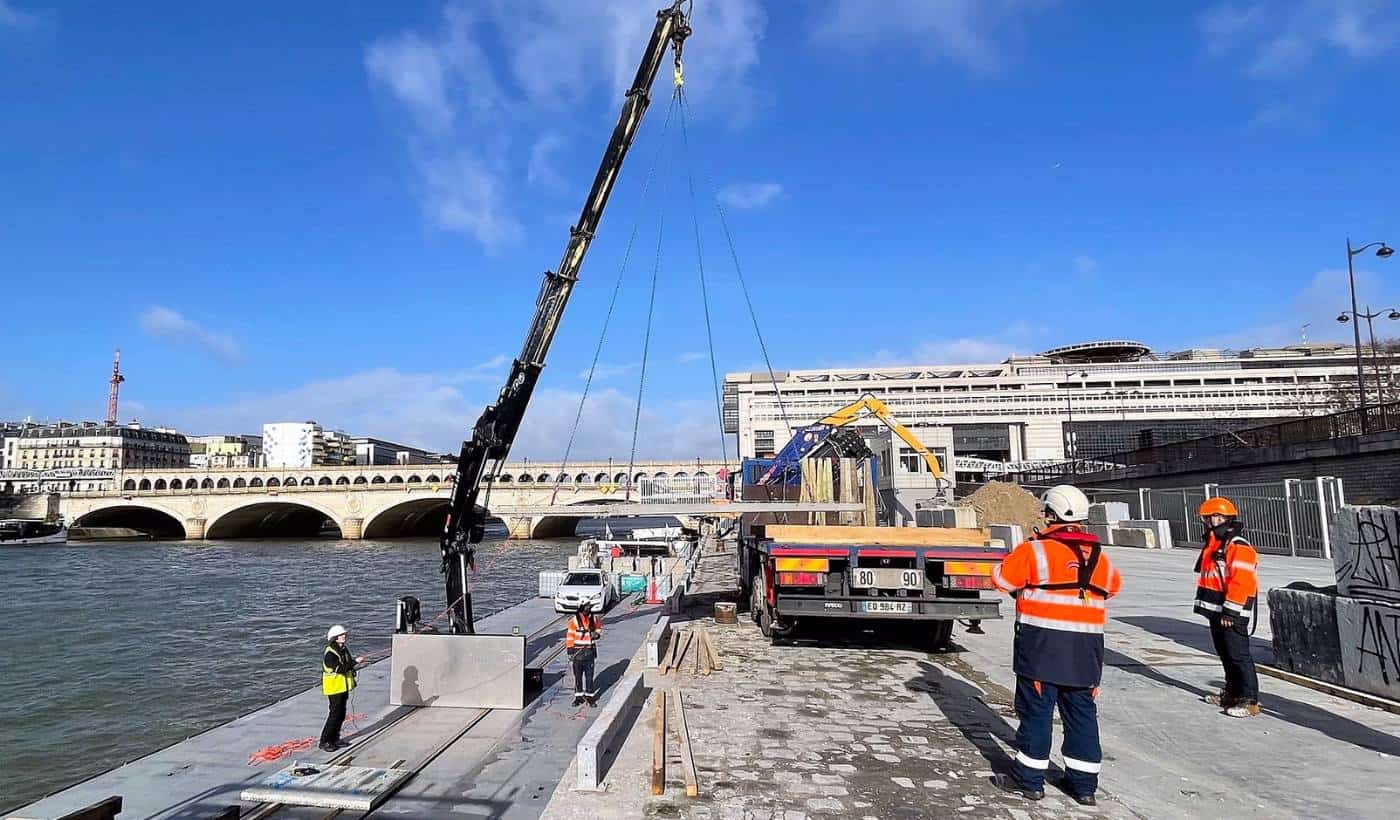
River transport, a vital solution in France
Goods transport is a notorious cause of inconvenience to local residents, especially along the last stretch into the city, creating truck traffic jams, pollution, noise pollution, safety hazards, and so on. The number of trucks circulating in urban areas has become a real issue for elected officials, in relation to noise pollution and road congestion. Reducing the impacts of transportation is now a major concern for local authorities; the same goes for the companies that help them carry out their projects. But how can we enhance cleaner industrial transport and foster systems that are more beneficial to the region than truck transport? Boasting Europe’s largest rail and river networks, France has a solid foundation from which to build on modes of transport other than road freight. Since they are more ecological and energy-efficient, railway and river transport are increasingly considered as solutions for the supply of construction sites. River transport, as yet little used, could become an important means of complementing road and rail transport in the future.Other opportunities offered by river transport
River transport could thus contribute to relieving congestion on other networks, giving the regions breathing space, and, ultimately, improving the quality of life for French people. As well as reducing the inconveniences listed above, river transport can also act as a high-value response to the economic, ecological, and energy challenges faced by different territories. Substituting river freight for road freight – the main mode of transport currently used for Ile-de-France construction sites – offers a new, more sustainable supply solution: according to Voies Navigables de France (VNF, Navigable Waterways of France), river transport is 3 to 4 times more energy-efficient than road transport, and it generates 5 times less CO2 emissions, with a total absence of fine abrasion particles. At the Greater Paris sites, for instance, river transport could make a major contribution to addressing the air quality issue raised by Métropole du Grand Paris (Greater Paris), particularly with regard to the establishment of low-emissions zones (ZFE). With diesel use set to end by 2024 throughout the Paris metropolitan area, some construction companies, such as Bouygues Construction, are already preparing by testing new means of transport that combine river freight solutions with biomethane and electric trucks.Did you know?
A single river convoy can transport the equivalent of 230 trucks or 4 trains. The waterways are far from saturated: at present, they could accommodate 2 to 4 times more traffic. In other words, river transport offers an opportunity to enhance the performance, attractiveness, and quality of life of our territories, bringing both environmental and economic benefits.River transport, already tested and approved by Bouygues Construction and its customers
Having recognised waterways as a useful means of transport, the Bouygues Construction group has been using them for several years already. For example, the group’s subsidiary, Bouygues Bâtiment France, tested an innovative means of river transport to supply three Parisian construction sites: A self-unloading vessel designed for urban distribution, that eliminates the need for handling equipment on the quays. The boat used was chosen because not only is it one of the most fuel-efficient, it is also coupled with the use of biomethane and electric trucks for final delivery to the 3 construction sites. This barge can hold 280 tonnes of materials, the equivalent of 14 truckloads. It all goes to show that river transport has the capacity to deliver all types of goods in greater quantities.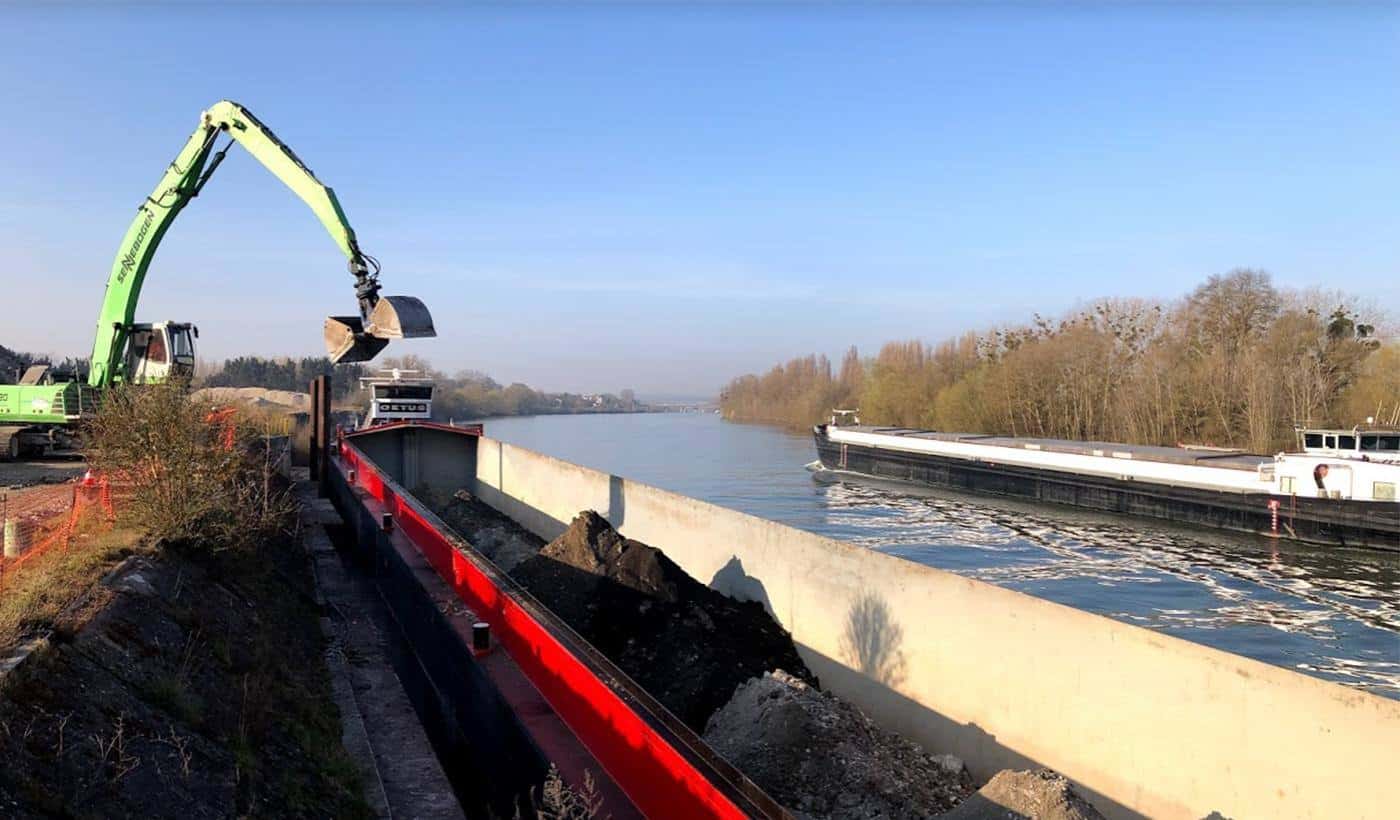 Bouygues Construction supplies the Seine Parisii site using river transport. The initiative was hailed by the City of Paris in a ceremony attended by representatives of the Roads Department, as the barge unloaded one of its cargoes.
Bréxillon, another subsidiary of Bouygues Construction that specialises in depollution, has also been using river transport for several years, raising the pace over the last few years to meet low carbon and circular economy challenges. Barges weighing 350 to 2200 tonnes evacuate or deliver various types of materials (polluted soil, inert waste, rubble, quarry materials) including recycled materials (sand, crushed concrete, fertile soil, etc.). These trips are made either departing from the work sites or from an ecocentre’s private quayside. Since January 2021, 20% of the earth excavated by the teams has been transported by river: the equivalent of nearly 10,000 truckloads that would otherwise have travelled by road.
Bouygues Construction supplies the Seine Parisii site using river transport. The initiative was hailed by the City of Paris in a ceremony attended by representatives of the Roads Department, as the barge unloaded one of its cargoes.
Bréxillon, another subsidiary of Bouygues Construction that specialises in depollution, has also been using river transport for several years, raising the pace over the last few years to meet low carbon and circular economy challenges. Barges weighing 350 to 2200 tonnes evacuate or deliver various types of materials (polluted soil, inert waste, rubble, quarry materials) including recycled materials (sand, crushed concrete, fertile soil, etc.). These trips are made either departing from the work sites or from an ecocentre’s private quayside. Since January 2021, 20% of the earth excavated by the teams has been transported by river: the equivalent of nearly 10,000 truckloads that would otherwise have travelled by road.
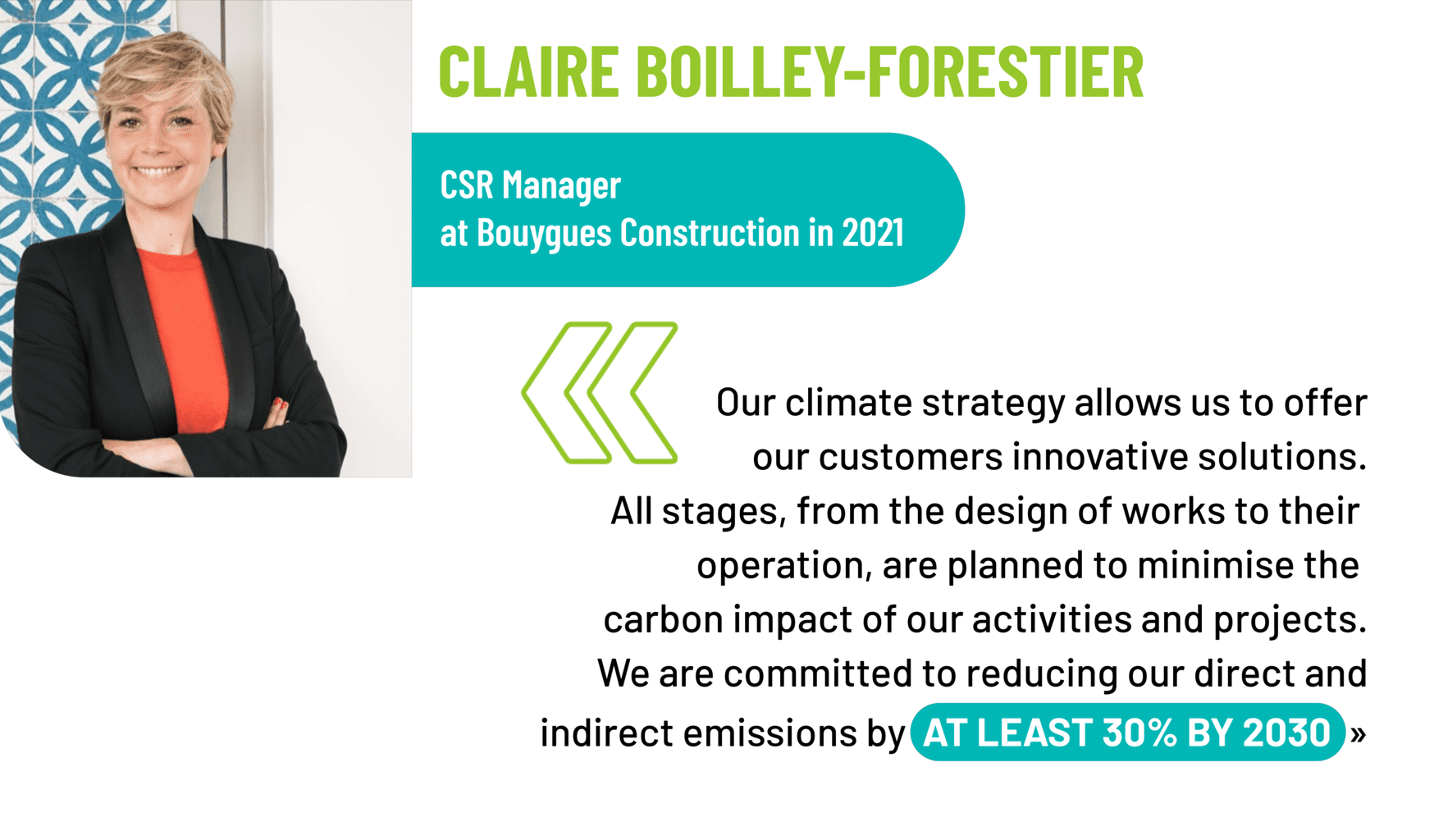
A platform for engagement
Inspired by the potential that river transport offers to confront the energy and logistics challenges faced by local authorities, ten business leaders, including Pascal Minault, CEO of Bouygues Construction, signed an opinion piece calling for the growth of this mode of cargo transportation. Together, they advocate for other avenues to be unblocked and for reducing pollution through the many channels already developed in France. They thus undertake to integrate river transport into their logistics chains, by associating it with other modes of transport in a smart way.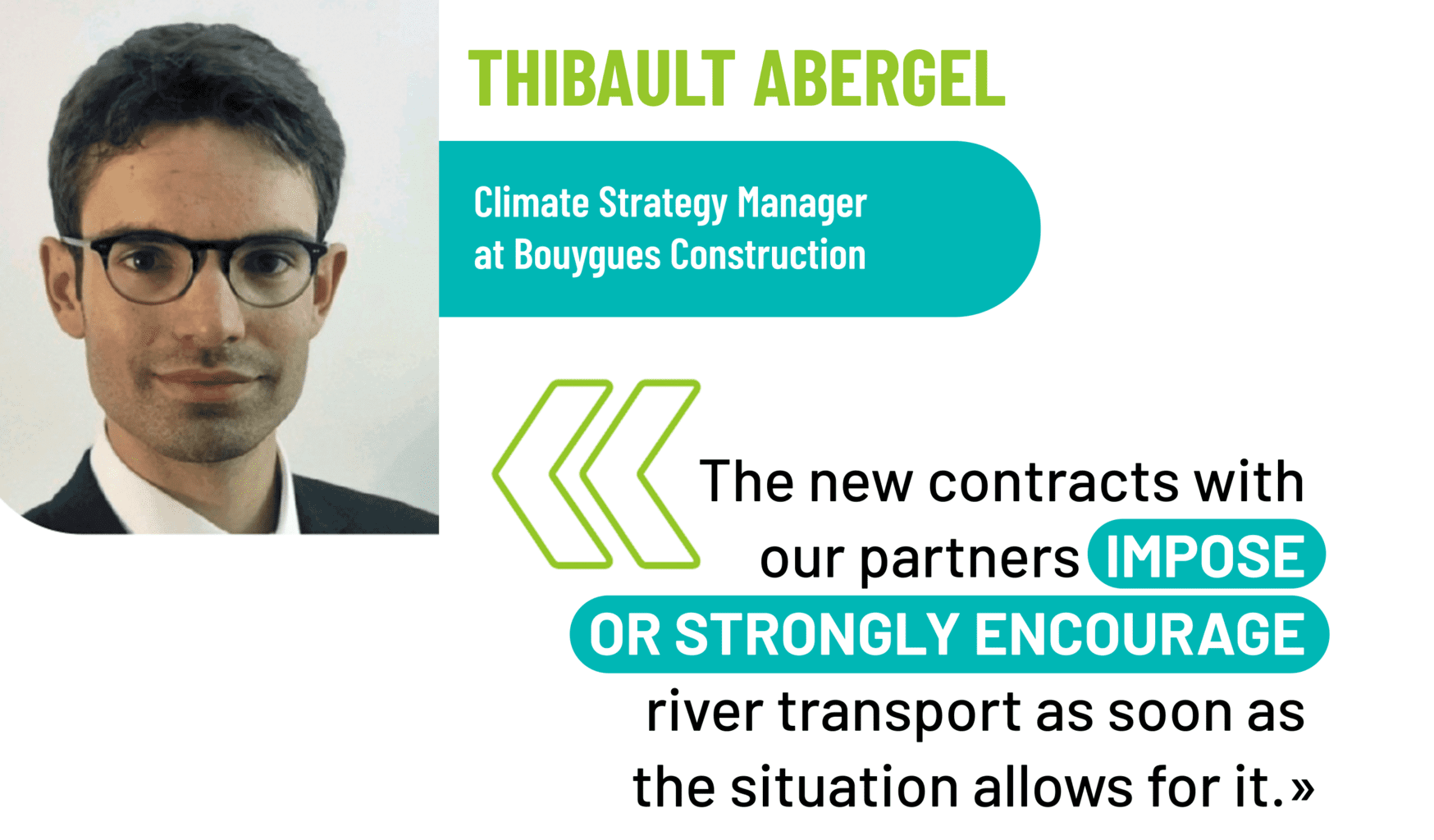
More reading
Read also



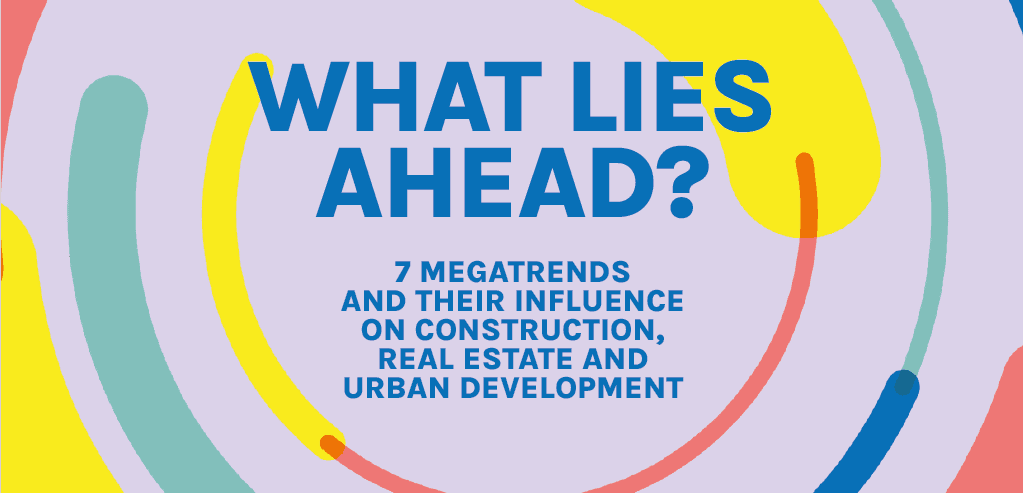
What lies ahead? 7 megatrends and their influence on construction, real estate and urban development
Article
20 minutes of reading

